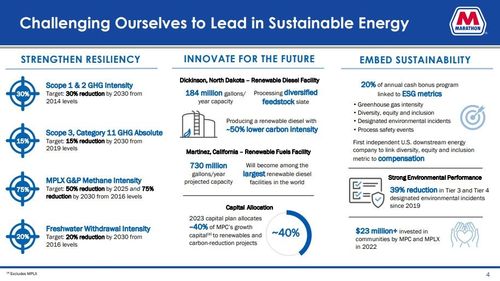Marathon: Martinez biorefinery to reach full production in 2023

SOURCE: Marathon Petroleum Corp.
October 31, 2023
BY Erin Krueger
Marathon Petroleum Corp. on Oct. 31 reported that the renewable diesel joint venture at its Martinez refinery in California is expected to be operating at its full 730 MMgy capacity by the end of the year.
Mike Hennigan, CEO of Marathon, discussed the project and Marathon’s other renewable initiatives during the company’s third quarter earning call.
Advertisement
The Martinez project is being developed in partnership with Neste. The biorefinery reached full Phase I production capacity of 260 million gallons per year during the first quarter of 2023. Phase II activities to add a feedstock pretreatment unit and boost capacity to 730 MMgy began earlier this year.
“The Martinez renewable fuel facility is being delivered safely, on time, and on budget—and by the end of 2023, the facility is expected to produce 730 million gallons per year,” Hennigan said during the earnings call. “At that point, Martinez will be among the largest renewable diesel facilities, with a competitive operating profile, robust logistics flexibility, and advantaged feedstock slate, and should benefit from the global strategic relationship with Neste.”
Advertisement
Hennigan also noted the company’s 180 MMgy renewable diesel facility in Dickinson, North Dakota, is operating well. “The facility processed 75 percent advantaged feeds during the third quarter,” he said. The nearby Spiritwood soybean processing plant, developed via a joint venture with ADM, is nearing completion and is expected to deliver enough vegetable oil to produce approximately 75 MMgy of renewable diesel.
In addition to Marathon’s activities in the renewable diesel space, Hennigan said the company is also advancing early-stage developments through its interests in low carbon intensity renewable natural gas (RNG) and other small-scale investments. He said those projects will help lower the carbon intensity of the company’s operations and the products it supplies.
Marathon in March acquired a 49.9 percent interest in LF Bioenergy, and emerging U.S.-based RNG producer. Dave Heppner, senior vice president of strategy and business development at Marathon, commented on the LF Bioenergy acquisition during the earnings call, noting the company currently plans to build out 13 dairy RNG projects.
Related Stories
Marathon Petroleum Corp. on Aug. 5 released second quarter financial results, reporting improved EBITDA for its renewable diesel segment. The company primarily attributed the improvement to increased utilization and higher margins.
Chevron Corp. on Aug. 1 confirmed the company started production at the Geismar renewable diesel plant in Louisiana during the second quarter after completing work to expand plant capacity from 7,000 to 22,000 barrels per day.
The public comment period on the U.S. EPA’s proposed rule to set 2027 and 2027 RFS RVOs and revise RFS regulations closed Aug. 8. Biofuel groups have largely expressed support for the proposal but also outlined several ways to improve the rulemaking.
In celebration of World Biodiesel Day, MOL Group on Aug. 8 announced SAF was successfully produced for the first time at INA’s Rijeka Refinery during a pilot project to process biocomponent. Renewable diesel was also produced.
Iowa farmers have a new market opportunity for their 2025 soybean crop. Landus is expanding its Clean Fuel Regulation initiative, made possible by recent policy changes expected to increase Canada's demand for liquid biofuel.
Upcoming Events










